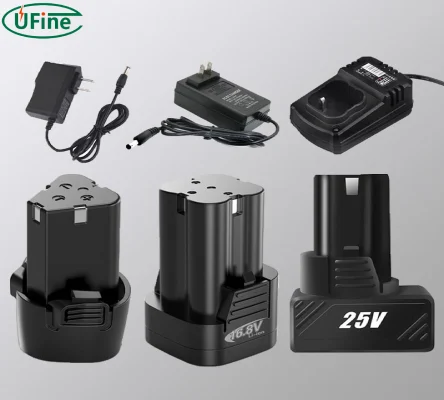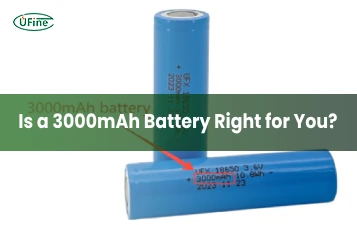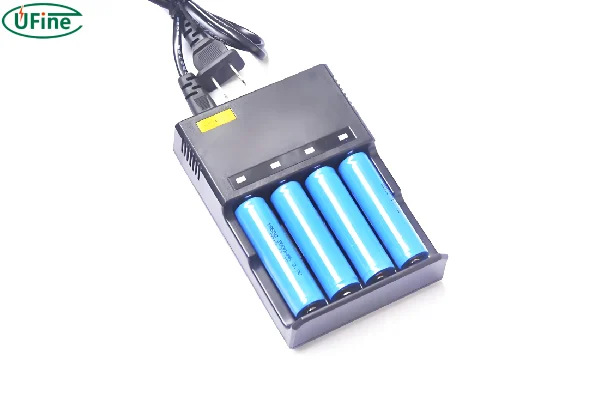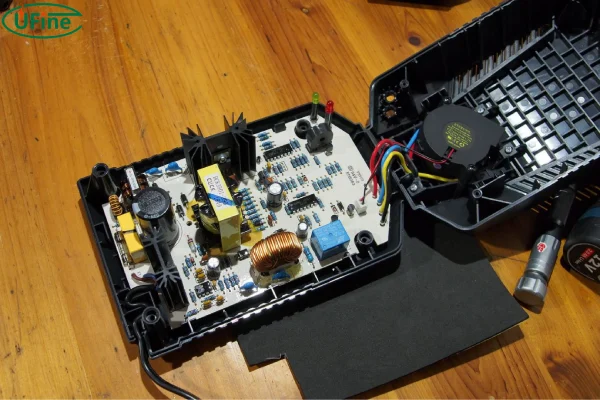Part 1. Why choose a quality battery charger?
A high-quality battery charger is crucial for maximizing the performance and lifespan of lithium batteries. Lithium batteries, notable for their efficiency and extended life, require chargers that can handle their specific chemistry and charging characteristics. The use of a substandard charger can have detrimental effects on both the battery and the connected devices.
Key Benefits of a Quality Battery Charger
-
Enhanced Battery Lifespan:
-
A reliable charger helps in maintaining the health of lithium battery cells, preventing overcharging and deep discharging.
-
Proper charging cycles ensure the battery retains its capacity over time, reducing the need for frequent replacements.
-
-
Safety Assurance:
-
Quality chargers often include safety features like overvoltage protection, temperature monitoring, and short-circuit prevention.
-
These features are critical in preventing hazardous incidents, including overheating, fires, or explosions.
-
-
Optimal Performance:
-
High-grade chargers provide consistent power flow, ensuring that lithium batteries charge efficiently.
-
They maintain the battery’s optimal performance levels, which is essential for devices that demand high energy output.
-
Critical Features to Consider
-
Charging Speed:
-
Advanced chargers offer various charging rates, including fast charging, without compromising battery health.
-
-
Compatibility:
-
They support multiple types of lithium batteries, including Lithium Iron Phosphate (LiFePO4) and Lithium-Ion (Li-Ion) variants.
-
-
User-Friendly:
-
Quality chargers come with intuitive interfaces, including digital displays and auto-detection functions for ease of use.
-
Implications of Using Subpar Chargers
-
Reduced Battery Efficiency:
-
Inferior chargers can lead to incomplete charging cycles, limiting battery capacity and operational life.
-
-
Safety Risks:
-
The lack of essential safety features in cheaper chargers increases the risk of damage both to the battery and the device it’s powering.
-
-
Economic Impact:
-
Investing in high-quality chargers reduces long-term costs associated with frequent battery replacements and potential damage to expensive devices.
-
Conclusion
Investing in a high-quality battery charger is not just about immediate convenience but plays a significant role in ensuring safety, extending battery life, and maintaining the performance of the devices in use. The upfront cost of a superior charger outweighs the potential risks and long-term expenses associated with inferior alternatives.
Part 2. Lithium battery charger types

Understanding the different types of lithium battery chargers is essential when selecting the right model for various applications. Each charger type serves specific functions, catering to different needs and preferences.
1. Basic Chargers
Basic chargers are the most straightforward type, often involving simple plug-and-charge functionality. They are generally affordable and easy to use, making them suitable for everyday tasks. However, these chargers may not provide advanced features such as overcharge protection or temperature monitoring.
2. Smart Chargers
Smart chargers, also known as intelligent chargers, use microprocessors to manage the charging process. They offer several advantages, including:
-
Optimized Charging: Adjust the current and voltage based on the battery’s state.
-
Safety Features: Include overcharge protection, short-circuit protection, and thermal management.
-
Maintenance Mode: Prevent battery degradation by maintaining optimal charge levels.
3. Multi-Bay Chargers
Multi-bay chargers allow for charging multiple batteries simultaneously. These are particularly useful in professional settings where numerous batteries need to be charged in a short time. Multi-bay chargers can come with smart features, enhancing their utility and safety.
4. Portable Chargers
Portable chargers are designed for mobility, ideal for users who require on-the-go charging solutions. They can be powered by USB connectors, car outlets, or small solar panels. Despite their compact size, many portable chargers incorporate smart technology for safe and efficient charging.
5. Fast Chargers
Fast chargers significantly reduce the charging time compared to standard models. They are perfect for scenarios where time is of the essence. However, users should note that consistent use of fast charging can affect the battery’s lifespan. Advanced fast chargers often include features to mitigate potential battery wear.
6. Balancing Chargers
Balancing chargers are specialized for charging lithium-ion polymer (LiPo) batteries. They ensure each cell in a battery pack reaches the same voltage, improving performance and extending the battery’s life. These chargers are imperative for applications requiring precise voltage management, such as in RC models and drones.
7. Solar Chargers
Solar chargers utilize photovoltaic panels to convert sunlight into electrical energy. They are environmentally friendly and offer an excellent solution for outdoor activities where traditional power sources are unavailable. Solar chargers may incorporate smart charging features but typically require optimal sunlight conditions to perform effectively.
Part 3. Common voltages of lithium battery chargers
Lithium battery chargers come in a variety of voltages to accommodate different types of lithium batteries, each with its specific requirements. Here’s a rundown of the common voltages you’ll encounter:
-
3.7V Chargers
- Single Cell Chargers: These chargers are designed for single-cell lithium-ion or lithium-polymer batteries. The nominal voltage of a single lithium cell is 3.7V, and the fully charged voltage is typically around 4.2V. These chargers are common for small devices like smartphones, cameras, and other portable electronics.
-
7.4V Chargers
- Two-Cell (2S) Chargers: These are for batteries with two cells connected in series, resulting in a nominal voltage of 7.4V (each cell being 3.7V). They are commonly used in devices like drones, RC cars, and some power tools.
-
11.1V Chargers
- Three-Cell (3S) Chargers: These chargers are for three-cell batteries, with a nominal voltage of 11.1V. Fully charged, these batteries reach 12.6V. They are often used in higher-power applications, including larger drones, RC helicopters, and other remote-controlled devices.
-
14.8V Chargers
- Four-Cell (4S) Chargers: For batteries with four cells in series, resulting in a nominal voltage of 14.8V and a fully charged voltage of 16.8V. These chargers are common for high-performance RC vehicles, drones, and some specialized electronic equipment.
-
18.5V Chargers
- Five-Cell (5S) Chargers: These are for five-cell batteries, which have a nominal voltage of 18.5V and a fully charged voltage of 21V. These chargers are used in applications requiring even higher power and capacity.
-
22.2V Chargers
- Six-Cell (6S) Chargers: These chargers are designed for six-cell batteries, with a nominal voltage of 22.2V and a fully charged voltage of 25.2V. They are typically used in large drones, electric bikes, and other high-power applications.
Part 4. LiPo charger
Lithium Polymer (LiPo) chargers are specialized to handle the unique charging requirements of LiPo batteries. When selecting a LiPo charger, a discerning buyer should consider several critical features to ensure safety, efficiency, and longevity of the battery.
Balancing Capabilities
One of the primary functions of a LiPo charger is cell balancing. Cell balancing ensures that each cell within the battery pack reaches the same voltage level, which helps prevent overcharging and prolongs the lifespan of the battery. Look for chargers with built-in balance ports and the ability to balance charge multi-cell batteries.
Charge Rate (Current) Options
Adjustable charge rates are crucial, as different LiPo batteries have varying optimal charge currents. The charger should offer a range of current settings, allowing the user to select the appropriate charge rate for their specific battery. This feature not only enhances battery health but also provides flexibility for charging different battery sizes.
Safety Mechanisms
Safety features are paramount when dealing with LiPo batteries due to their sensitivity and potential hazards. Essential safety mechanisms include:
-
Overcharge Protection: Prevents the battery from exceeding its maximum voltage.
-
Short Circuit Protection: Shields the charger and battery from potential damage caused by short circuits.
-
Temperature Monitoring: Some chargers feature thermal sensors to monitor battery temperature, reducing the risk of overheating.
Display and Interface
A clear and intuitive display is vital for monitoring the charging process. Features to look for include:
-
Voltage, Current, and Capacity Readouts: Real-time information on individual cell voltages, overall battery voltage, charge current, and capacity charged.
-
User-Friendly Interface: Easy-to-navigate menus and straightforward programming options for setting charge parameters.
Power Source Versatility
Versatility in power sources enables the charger to operate in different environments. Consider chargers that can accept both AC (wall outlet) and DC (car battery) inputs. This dual compatibility is particularly useful for users who may need to charge batteries in various locations.
Size and Portability
For users who need to charge LiPo batteries on the go, the size and portability of the charger are important. Compact chargers are easier to transport and store, making them convenient for field use.
Additional Features
Some advanced LiPo chargers offer expanded functionality. These may include:
-
Discharge Capability: Helps in storage charging or cycling the battery.
-
Memory Presets: Stores custom charge profiles for different battery types and capacities.
-
PC Connectivity: Enables firmware updates and detailed charge data analysis.
When investing in a LiPo charger, these features collectively ensure a safe, efficient, and user-friendly experience, tailored to meet the specific needs of LiPo battery maintenance and usage.
Part 5. Can I charge a lithium battery with a normal charger?
One common question that arises among users of lithium batteries is whether these can be charged with a normal charger. While it might seem convenient, the answer is more nuanced and needs a detailed understanding of both battery chemistry and charger functionalities.
A normal charger, typically designed for lead-acid or nickel-based batteries, does not accommodate the critical charging parameters necessary for lithium batteries. Lithium batteries have specific charging requirements, which if not adhered to, could lead to serious consequences:
-
Overcharging: Normal chargers are often not equipped with the appropriate mechanisms to prevent overcharging, which can cause lithium batteries to overheat, swell, or even catch fire.
-
Charging Voltage: Different battery chemistries require different charging voltages. Lithium batteries are usually charged at a lower voltage compared to lead-acid batteries. Using a charger with a higher voltage might irreversibly damage lithium battery cells.
-
Charging Algorithm: The charging algorithm for lithium batteries includes constant current (CC) and constant voltage (CV) stages. A normal charger may not provide these stages appropriately, leading to incomplete or unsafe charging cycles.
-
Protection Mechanisms: Lithium chargers are endowed with robust protection mechanisms such as thermal cut-offs and short-circuit protection, which are generally absent in standard chargers designed for other chemistries.
Using a normal charger for lithium batteries can lead to compromised performance and safety risks. Consider the following points:
-
Compatibility: Verify if the charger is explicitly compatible with lithium batteries. Product specifications and user manuals usually provide this information.
-
Charger Design: Chargers that employ intelligent charging systems, incorporating microcontrollers for precise control, are more suitable for lithium batteries.
-
Temperature Monitoring: Advanced lithium battery chargers include temperature sensors to monitor and adjust charging parameters dynamically, ensuring the battery remains within safe operational thresholds.
-
Charge Termination: Proper lithium chargers have aptitude for accurate charge termination, stopping the charging process when the battery is fully charged to prevent overcharging.
Therefore, while the practical allure of using a normal charger exists, the specificities of lithium battery maintenance and safety make it imperative to use a charger designed for the task. Steps must be taken to ensure that chargers have the correct specifications and safety certifications. This ensures optimal battery life, performance, and user safety.
Part 6. 9 Key features to buy lithium battery charger
When considering the purchase of a lithium battery charger, several key features should not be overlooked to ensure optimal performance and longevity of the battery.
-
Safety Features
Chargers must incorporate essential safety elements, including:-
Overcharge Protection
-
Short Circuit Protection
-
Temperature Monitoring
-
Reverse Polarity Protection
-
-
Charging Speed
A charger should offer multiple charging rates to accommodate various battery sizes and capacities. Quick charging options, paired with slower, more controlled charging rates, provide users with flexibility and efficiency. -
Compatibility
Universal compatibility with a wide range of lithium batteries enhances the usability of the charger. Features to look for include:-
Support for different battery chemistries (e.g., Li-ion, LiFePO4)
-
Multiple voltage and current settings
-
-
Portability and Design
The physical design of the charger affects its practical use. Desirable characteristics include:-
Compact and lightweight for easy transport
-
Durable housing materials
-
Intuitive user interface
-
-
Intelligent Charging
Smart charging functionalities, such as microprocessor control, ensure precise management of the charging process. Advantages include:-
Optimized charging cycles
-
Reduced risk of battery damage
-
Enhanced battery life
-
-
Indicator Lights and Display
Clear, informative displays and indicator lights can provide real-time updates on the charging status and health of the battery. This includes:-
LED indicators or LCD screens
-
Status notifications (charging, full charge, error conditions)
-
-
Power Source Flexibility
A charger with adaptable power source options, such as AC and DC inputs, allows users to charge batteries in a variety of locations, whether at home, in a vehicle, or outdoors. -
Cost and Warranty
Evaluating the cost against the features provided and ensuring an adequate warranty period can impact the overall value of the charger. -
User Reviews and Reputation
Considering user reviews and brand reputation can offer insights into real-world performance and reliability.
Related Tags:
More Articles

Is a 3000 mAh Lithium Battery Enough for Your Device?
Wondering what a 3000mAh battery means? Learn about its power, lifespan, types, and how to choose the best one for your device!
Learn About Lithium Battery Kits
Discover the ultimate guide to lithium battery kits—types, safety, installation, and cost analysis. Make the right choice for solar, RV, or off-grid power!
Selecting the Perfect Ah for Your 48V Li-ion Battery Pack
Struggling to choose the right Ah for your 48V Li-ion battery pack? This in-depth guide covers everything you need to make the best choice. Find out more now!
LiFePO4 Pouch Cells Explained: Advantages, Applications & Comparison
Learn all about LiFePO4 pouch cells, their structure, lifespan, advantages, and how they outperform other lithium battery types. Make the right choice!
12Ah Lithium Battery Guide: Uses, Lifespan & Tips
12Ah lithium batteries last longer, charge faster & weigh less than lead-acid. See best uses, charging tips & how to extend lifespan!





